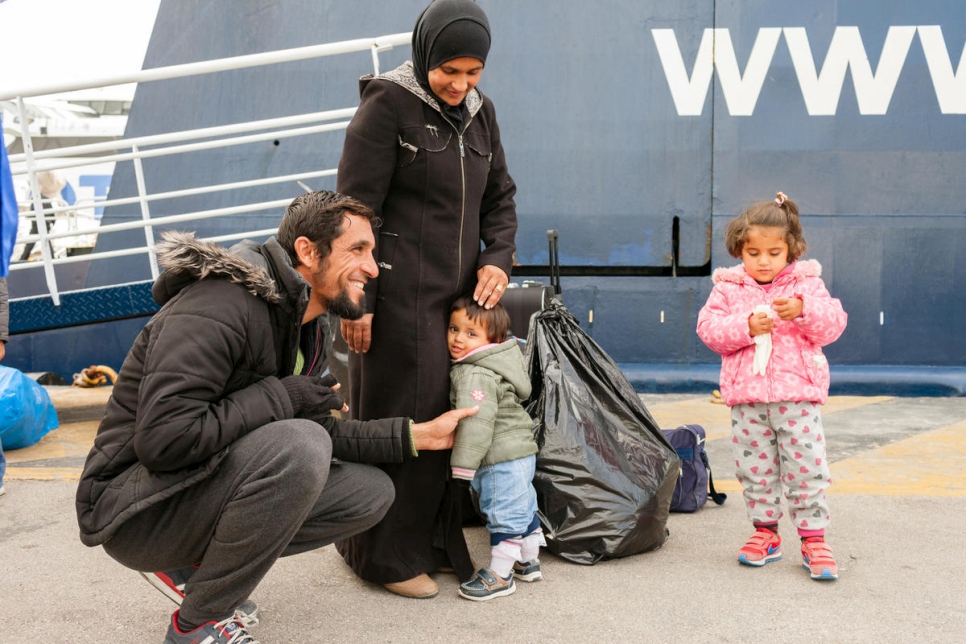
Mohamad Alhajer with his family on the dockside in the port of Piraeus, Greece. The family is being transferred from the island of Samos to the mainland under a programme supported by UNHCR.
ABOARD THE SS NISSOS CHIOS, Greece – Mohamad Alhajer was desperate to leave the Greek island of Samos. He worried about the health and safety of his young family after weeks of winter hardship living in a makeshift tent at an overcrowded hillside reception centre for refugees and migrants above the seaside town of Vathy.
So, the 36-year-old Syrian asylum-seeker, a disabled father of two girls, was delighted when he was told he and his vulnerable family were going to be transferred that night to Piraeus on the mainland, to a place in an accommodation programme run by UNHCR, the UN Refugee Agency, and funded by the European Union.
Speaking on the deck of the ferry SS Nissos Chios after the first night on board with his wife, Hanaa, 30, and daughters Maria, four, and Khadija, two, he said: “It’s the first time we slept well, undisturbed by noise. There are no rats here.”
They were among a group of 13 vulnerable people, including seven members of an Iraqi family, who were transferred that night to the mainland. Arrivals from Turkey have continued to put pressure on the Reception and Identification Centres on the islands, particularly Vathy on Samos and Moria on Lesvos.
UNHCR has been supporting the government in the stepped-up transfers of people from the islands to the mainland. More than 10,000 people have been transferred since October, including 2,200 from Samos, and about 20,000 since the start of 2017. This has helped ease overcrowding and improve conditions.
Although numbers in the Vathy centre have declined from a peak of more than 2,000 in September to 1,450 now – double the capacity of 700 – the situation remains grave. Some people spend their time in the town to help them forget for a few hours.
Mohamad and other asylum seekers, as well as UNHCR staff, highlight the main concerns, including rats, shortages of water and electricity, fights, the risk of sexual and gender-based violence, the need for more security and medical staff, not enough segregated bathing facilities and latrines and better shelter against the rain and cold.
“I don’t care where we go, just so long as it’s not in the camp.”
“It’s not what I expected. I expected better conditions,” Mohamad said, adding that, despite the ordeal in Vathy, he was grateful for the chance to apply for asylum. “I don’t care where we go, just so long as it’s not in the camp.”
After the EU-Turkey statement in March 2016 on the flow of irregular sea crossings, and the closure that month by countries in the region of the Balkan route leading north from Greece, the number of arrivals on the Greek islands fell drastically compared with the emergency of 2015-2016.
Now everyone reaching Samos by the sea route must spend time in the Vathy centre, which occupies a thin sliver of land on the side of a steep hill.
https://www.youtube.com/watch?v=6pnuLDo0lE0
After a harsh winter on Samos, a refugee family sees hope in transfer to Greek mainland (Dalal Mawad, producer / Bela Szandelszky, camera-editor)
Conditions in Vathy and other island centres started to deteriorate from August last year, when arrival numbers began to increase and outpace transfers of people to the mainland.
At that time, the government was taking over full management of the response to the refugee crisis.
The numbers of arrivals – almost 30,000 in 2017 compared with 173,000 in 2016 – have stretched the government’s ability to respond and caused grave concern. People generally spend longer on the islands after making asylum applications.
Mohamad and his family reached the reception centre in December after walking much of the way to Idlib province in north-west Syria, then crossing by boat to Samos from Turkey. He had already been injured as a result of the war, having lost three fingers of his right hand and suffered severe damage to his forearm in an air strike.
He sought advice about his injuries in Vathy. “They told me I need urgent surgery, but nothing has happened,” he said, echoing other complaints about the lack of medical staff. “They don’t even give me the medicine I got in Syria.”
“It’s going to be a new start.”
Daughter Maria also needs help. She was traumatised when her uncle, Mohamad’s brother, was killed in front of her in an air raid. Three of her maternal uncles also died in the conflict.
Many of those arriving on the islands, mainly from Syria, Iraq and Afghanistan, are young families, as well as people with specific needs, such as Mohamad and Maria.
UNHCR and other organizations acknowledge the difficulties facing the government and the progress that has been made but have been urging the authorities to press ahead with measures to tackle the problems on the islands. This includes the speedier deployment of health officials to the centres and continuing transfers to the mainland.
Mohamad, Hana, Maria and Khadija face the challenge of living in a new and bustling city. After the Nissos Chios docked in Piraeus, they were taken to a transit building in Athens before they can move into an apartment while their asylum claims are processed.
UNHCR has places for more than 22,000 people in the accommodation scheme, which provides cash assistance, shelter and safety.
“I’m still a bit worried about Athens,” Mohamad said. “It’s going to be a new start. I worry in general about the future as everything is uncertain.” Although he speaks daily with family members still in Syria, he has no wish to return.
He is focusing on life in Greece. Besides having his arm and hand treated, “I want to learn the language, ensure an education for my daughters, and find employment,” he said. “I’m very grateful to the Greek people.”
Share on Facebook Share on Twitter